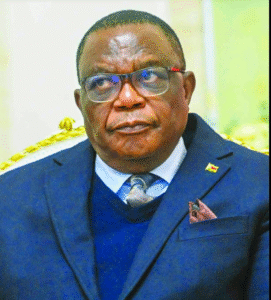GAYTON MCKENZIE’S BORDER STUNT EXPOSES DANGEROUS XENOPHOBIC POLITICS

The recent actions of Gayton McKenzie, leader of South Africa’s Patriotic Alliance (PA), at the Limpopo River border with Zimbabwe, have ignited alarm and outrage across Southern Africa. What was framed as a border patrol mission by a political party is, in truth, a dangerous display of xenophobic populism masquerading as patriotism.
McKenzie and his deputy, Kenny Kunene, led PA members to the Beitbridge border during the festive season, claiming to stop undocumented Zimbabweans from crossing into South Africa. Armed with cell phones and slogans like “Abahambe” (“they must go”), they filmed themselves confronting desperate migrants at the riverbank. These videos, shared widely online, were not just publicity stunts—they were deliberate attempts to fuel division, fear, and hatred for political gain.
What McKenzie fails to acknowledge is the root cause of this migration crisis: Zimbabwe’s collapsed economy, authoritarian rule, and decades of mismanagement under ZANU PF. Millions of Zimbabweans have been forced to flee their homes, not by choice, but by hunger, joblessness, and repression. They are victims, not criminals.
The Limpopo River, long a symbol of regional connection, has become a stage for cruelty. The PA’s vigilante campaign, instead of offering solutions, exploits suffering. McKenzie brags about intercepting nearly 1,000 migrants, as though punishing the powerless fixes the problem. It doesn’t. It only shifts blame and ignores the real enemies: corrupt governments and failed leaderships—both in Zimbabwe and in South Africa.
This isn’t the first time xenophobic politics have taken hold in South Africa. From Operation Dudula to violent attacks on foreign nationals, we’ve seen how quickly hate can spread when leaders abandon empathy for applause. What McKenzie has done is pour fuel on an already burning fire, treating migrants like invaders rather than fellow Africans in crisis.
He questions the absence of the police, SANDF, and border officials. But the real question is: why is a political party playing border guard? Border control is a state function. What McKenzie has done is not patriotism—it’s vigilantism. It sets a dangerous precedent, where political actors take the law into their own hands and turn human suffering into a campaign strategy.
Worse, this approach ignores South Africa’s own responsibility. For years, the ANC government has allowed Zimbabwe’s crisis to deepen without action. Instead of leading a regional push for democratic reforms in Harare, Pretoria has stayed silent. Now, rather than addressing the root causes of migration, opportunists like McKenzie are attacking the symptoms—and the victims.
South Africa does have a right to secure its borders. But there is a difference between border control and mob rule. True leadership would demand regional solutions: pressuring ZANU PF, demanding free and fair elections in Zimbabwe, supporting refugees with dignity, and addressing the shared economic pain that affects all southern Africans.
By reducing a humanitarian crisis to a headline-grabbing stunt, McKenzie has exposed the real poverty—poverty of compassion, poverty of leadership, and poverty of vision. His actions will not fix the border. They will only deepen the pain.
Zimbabweans crossing the Limpopo River are not enemies. They are mothers, fathers, workers, and students seeking survival. Treating them as threats is not just cruel—it’s cowardly.
Southern Africa must rise above this. The fight is not between Zimbabwean migrants and South African citizens. The real battle is against the corruption, greed, and misrule that push people into the river in the first place. That’s where the outrage should be directed. That’s where the energy should go.
History will not remember who shouted “Abahambe” the loudest. It will remember who stood up for humanity when it mattered most.



